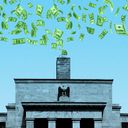The Fed is the only game in town, yet again

Friday morning, after a hot inflation number was released, stock and bond markets rapidly adjusted. Interest rates rose and stocks fell as investors figured, correctly, that it meant the Fed will raise rates more aggressively.
- This pattern has been happening since last fall, but it shows something interesting: Even as inflation has become a national crisis, the Fed is the only entity in Washington truly focused on bringing it down despite the pain that entails.
Why it matters: In the 2010s, the Fed was often called the "only game in town" because it sought to stimulate a weak economy while other branches of government sat on their hands. Now it's in that role again, even as the circumstances have turned 180 degrees.
- Indeed, that the Fed is willing to tighten monetary policy, even at the cost of a steep stock market downturn and a potential recession, shows why advanced economies have a politically independent central bank to begin with.
State of play: There are plenty of things the government could do to try to address the mismatch between supply and demand in the economy. It could raise taxes or cut spending, aiming to curtail demand. It could take steps to increase the supply of items where there are bottlenecks, particularly in energy.
- But in the actual world we're living in, the elected branches of government aren't doing those things, instead leaving it to the Fed to try to reduce demand by raising interest rates — despite those tools being blunt instruments for the task at hand.
- Fed tightening tends to most directly affect interest-sensitive sectors like housing, for example. And it can have counterproductive effects on the supply side of the economy if higher rates make companies reluctant to invest in a new capacity.
Nobody on Capitol Hill is talking seriously about a new wave of fiscal austerity.
- On the Democratic side, talk of a redesigned Building Back Better legislation that includes significant deficit reduction has remained just talk.
- Republican Sen. Rick Scott of Florida pitched the idea of ensuring low-income Americans pay at least some federal income tax should Republicans win control of Congress, implying a tax increase on millions — but backed away after his own party rebuked the idea.
The Biden administration has taken plenty of steps to try to address specific supply blockages, such as at ports, but has not eliminated Trump-era tariffs on Chinese imports. It has extended student loan relief, which tends to increase demand.
The bottom line: That leaves the central bankers gathering this week in a spiffy new conference room in Washington's Foggy Bottom neighborhood as the only people in town ready and able to try to fight inflation, even if it hurts.